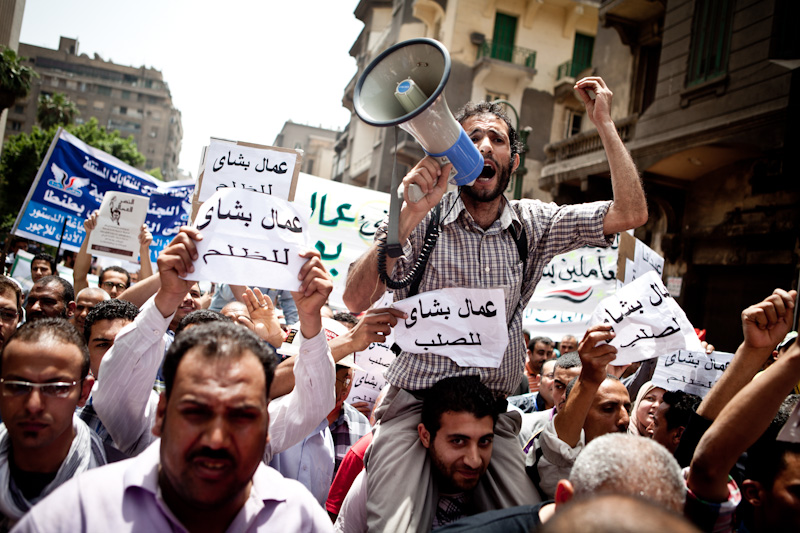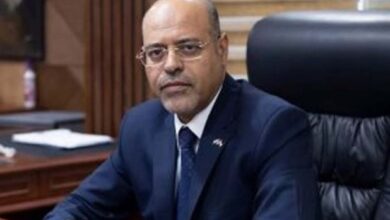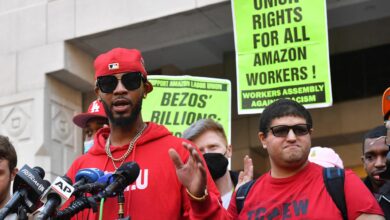
A controversial labor decree issued by President Mohamed Morsy on Sunday has been denounced and met with resistance from both the state-controlled workers’ federation and from independent unions.
Morsy’s decree No. 97/2012 was issued shortly after he also put out a constitutional declaration on 22 November, claiming a sweeping range of powers for himself which insulate him from accountability and judicial oversight.
Decree No. 97 stipulates that board members of the state-controlled Egyptian Trade Union Federation (ETUF) over the age of 60 are to be replaced by newly appointed members. This decree also stipulates a six-month extension to the ETUF board-members’ term of office, or the issuing of a new trade union law to replace Law 35/1976 and determine the date of elections — whichever comes first.
The ETUF’s last elections were held in October-November 2006. Its five-year term means that ETUF elections should have taken place in October-November 2011. However, in light of parliamentary and presidential elections, the union elections were postponed for a year — and now for another half year.
Morsy’s most recent decree contradicts announcements issued by the Muslim Brotherhood’s Khaled al-Azhary, now serving as minister of manpower, who in September declared that ETUF elections were to be held in October-November 2012.
Decree No. 97 is “an attempt by the Brotherhood to control the union structure which had previously been monopolized by the Mubarak regime,” comments Wael Habib, a caretaker board member of the ETUF.
Habib adds, “This is merely an attempt to replace old members of the National Democratic Party (NDP) with newer members from the now-ruling regime: the Muslim Brotherhood and its Freedom and Justice Party.”
“This decree has been tailored to fit only the Brotherhood and FJP. It ignores our demands for a minimum and maximum wage, the right to strike, the issuing of the Trade Union Liberties Law — which was prepared over a year ago and shelved ever since — and other demands,” says Habib.
“Morsy has proven to Egypt’s workers that the regime of dictator Mubarak was much more concerned with workers’ rights than the Brotherhood,” Habib argues. “Morsy has again shown that the Brotherhood is seeking to hijack the ETUF and the Manpower Ministry, along with the rest of the country.”
Habib explains that Decree 97 directly targets tens of ETUF unionists over the age of retirement, 60 years, “not because of their age, but because of their political affiliations and associations with the Mubarak regime.” Habib adds that most of these older unionists were members of the NDP. “Morsy is not seeking workers’ rights as he claims. He is only settling scores with the old regime.”
The ETUF’s elections, according to the provisions of Law 35/1976, are indirect elections whereby workers only get to vote for their local union committees — around 2,000 workplace unions nationwide. Meanwhile, the boards of the ETUF’s 24 general unions are selected through appointments and default elections.
Prior to the 25 January revolution, the ETUF’s executive board consisted of 22 NDP members out of 24, most of whom were over the age of 60. However, in early 2011 then-Minister of Manpower Ahmed Hassan al-Borai appointed tens of caretaker board-members to replace certain ETUF executives. Borai also presided over the drafting of the long-anticipated Trade Union Liberties Law. However, Borai’s initiatives appear to be in the process of being sidelined by the Morsy regime.
“We will never accept this new decree under any circumstance,” Habib says. The ETUF caretaker, who hails from the Misr Spinning and Weaving Company in Mahalla, says that workers’ protests against Morsy’s decrees would be staged at Al-Shaun Square in Mahalla on Tuesday and the ETUF would also organize rallies, marches and sit-ins.
Decree 97 has also been denounced by the Egyptian Federation of Independent Trade Unions (EFITU). Fatma Ramadan, executive board member of the EFITU, says, “Morsy’s first decree, following his complete takeover of state powers on 22 November, is a labor decree. This is a clear indicator that Morsy is seeking to monopolize the labor movement by first ‘Brotherhoodizing’ the Ministry of Manpower, and now the ETUF.”
“Morsy is clearly preparing a systematic crackdown against Egypt’s union movement, against the right to strike, against the right to organize and against union plurality,” Ramadan argues. “Morsy is attempting to put on a mask of democracy as he points out that the ETUF leadership was appointed by the Mubarak regime. Yet he is not seeking democracy in the ETUF, he is only looking to fill the federation’s seats with members of his own regime.”
“The Brotherhood-controlled Ministry of Manpower is now in the process of facilitating this takeover of the ETUF,” the organizer adds. “This is a blatant and unwarranted intervention in union affairs from the state.”
She went on to add that the right to establish independent unions is protected by international law — specifically the International Labor Organization’s Conventions No. 87 and 98 — which the Egyptian state ratified in the 1950s.
“We will never remain silent against these transgressions,” Ramadan says. “At the EFITU we are standing against Morsy’s takeover of the state and against the Ministry of Manpower’s takeover of the ETUF.” She adds that the EFITU has pitched two tents in Tahrir Square and is participating in the open-ended sit-in “against Morsy’s dictatorial decrees.”
Weeks earlier, the EFITU had threatened to resort to the administrative courts over Morsy and Azhary’s anticipated decisions. However, the president’s constitutional declaration on 22 November served to insulate his regime from such judicial appeals.
A host of NGOs, including the Center for Trade Union and Workers’ Services, the Egyptian Democratic Labor Congress, the Egyptian Center for Economic and Social Rights and the Land Center for Human Rights, have also issued statements denouncing Morsy’s constitutional declaration and Decree 97.
According to Karam Saber, director of the Land Center, “If Morsy was genuinely concerned about union plurality and democracy, then he would’ve issued the Trade Union Liberties Law to guarantee these rights."
“Instead he is simply removing old members of the NDP and appointing younger members from his Brotherhood and FJP.”
Saber explains that over 80 percent of ETUF executives are over the age of 60 and are former members of the NDP or Mubarak loyalists.
“If Morsy was genuinely concerned about democracy within the ETUF, then he would’ve called for trade union elections so that workers can democratically vote for their representatives,” he says. “Instead he has postponed these elections even further, while he seeks to handpick his own representatives.”
According to Saber, the Brotherhood wants to expand its sphere of influence beyond professional syndicates — white collar unions such as the lawyers, doctors or engineers — into the blue collar workers’ unions.
“I believe that the Brotherhood is exclusively interested in taking over the ETUF along with its workers’ bank, holiday resorts, workers’ university and its cultural centers across the country,” Saber says. “Not only do they want to Brotherhoodize the state, they also want to Brotherhoodize and monopolize the union movement.”
Yousry Bayoumi, a Muslim Brotherhood caretaker board member of the ETUF, could not be reached for comment. Attempts to reach Khaled al-Azhary were unsuccessful, as were attempts to contact Alaa Awwad, the ministry’s spokesperson.




